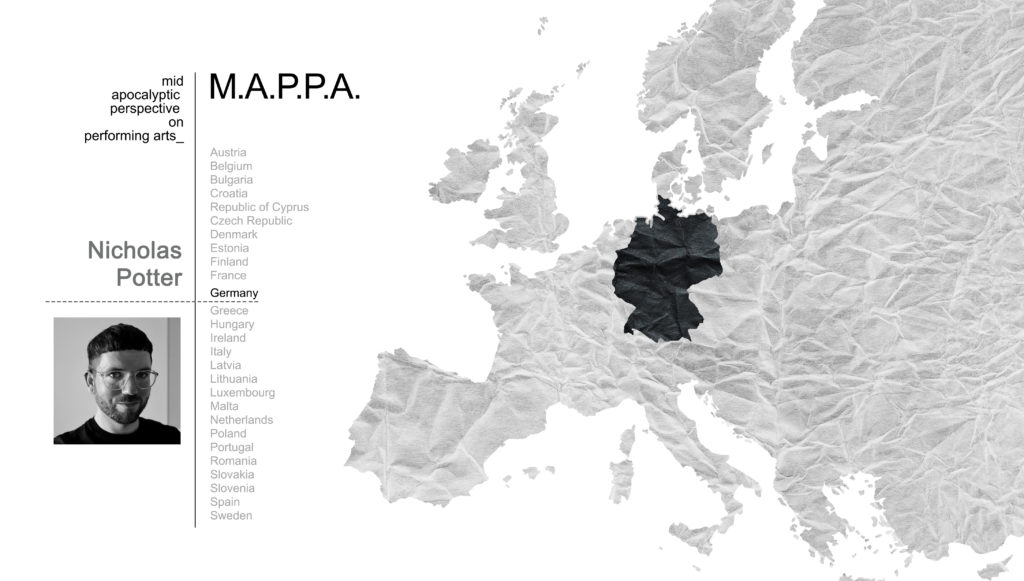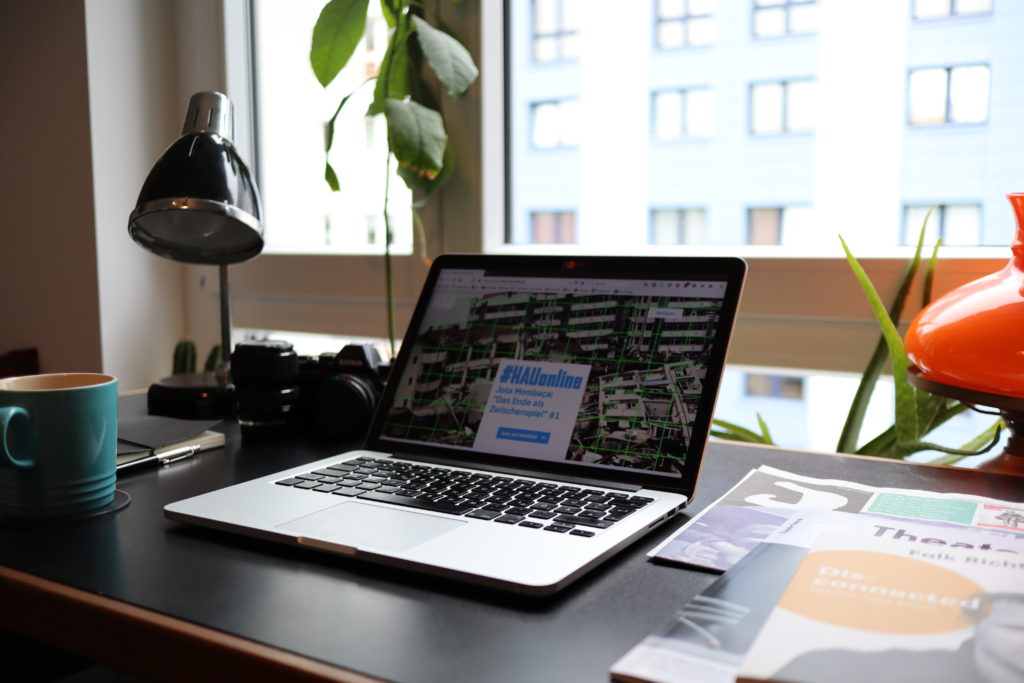
M.A.P.P.A. è un progetto di ricognizione e mappatura internazionale sulla critica dedicata alle performing arts. Abbiamo intervistato giovani giornalisti, osservatori e critici provenienti da tutta Europa.
Leggi le altre interviste di M.A.P.P.A.
Nicholas Potter è un giornalista freelance di origini britanniche, oggi di base a Berlino, dove si occupa di teatro, club culture, sottoculture, movimenti sociali e di genere. Ha scritto principalmente per taz, Jungle World e der Freitag. Attualmente è caporedattore presso Exberliner Magazine e blogger al Theatertreffen nelle edizioni 2019 e 2020.
Quali misure sono state prese a sostegno dei lavoratori dello spettacolo in Germania?
L’aiuto finanziario a disposizione di artisti indipendenti, giornalisti freelance e piccole aziende con meno di dieci dipendenti varia leggermente tra i land. A Berlino, dove hanno base molti creativi, lo Stato ha programmato un piano di sovvenzioni da 5000 euro a persona, più fino a ulteriori 9000 euro per costi operativi come l’affitto di uno studio, materiali, attrezzature, ecc. Il tutto a fondo perduto. Centinaia di migliaia di persone hanno chiesto queste sovvenzioni, alcune in modo non totalmente legittimo, e in pochi giorni la maggior parte ne disponeva sul conto corrente. A causa della situazione sono stati effettuati pochi controlli e, poiché la domanda era elevata, i fondi si sono esauriti molto rapidamente. Per le imprese culturali con più di dieci dipendenti, ad esempio un teatro privato, la municipalità di Berlino ha lanciato una nuova sovvenzione di 25.000 euro. Inizialmente ai teatri sono stati offerti dei prestiti, ma molti guadagnavano già prima così poco che non sarebbero mai in grado di ripagarli. Ufficialmente, i teatri rimarranno chiusi fino ad agosto, anche se molti pensano che questa data sia irrealistica. Si è già parlato di misure di allontanamento sociale, ad esempio vendere solo un terzo dei biglietti in modo che ci sia sempre spazio tra gli spettatori. Nel frattempo, alcuni dei più grandi teatri e reparti di costume dei teatri dell’opera stanno realizzando mascherine per varie case di cura.
Il periodo del lockdown ha visto molti teatri e compagnie pubblicare su internet parte dei loro archivi. Molte sono anche le performance nate online, così come si parla sempre più di residenze digitali. Persino i festival, luoghi di incontro per eccellenza, stanno proponendo un cartellone digitale. Come ti relazioni a questa modalità di fruizione?
Le registrazioni non possono né sostituire né catturare veramente un’esibizione dal vivo, ma sono incredibilmente preziose. Il teatro può spesso essere un’arte elitaria, inaccessibile ai più. Lo streaming rende il teatro più democratico, permettendo di raggiungere un pubblico più ampio. C’è anche un’altra utilità: finalmente, posso vedere performance da Belgrado, Parigi o Mosca con un click, o recuperare i classici come i lavori di Peter Stein alla Schaubühne. Attraverso le registrazioni, l’edizione del festival Theatertreffen di quest’anno è stata in grado di svolgersi online. I momenti di confronto che abbiamo avuto su Twitter, o tramite videoconferenza, sono stati comunque molto interessanti. Sono entusiasta dei nuovi formati digitali, che combinano lo streaming con la liveness della performance. Il Deutsches Theater sta lavorando su alcuni nuovi studi che verranno eseguiti dal vivo su un palco vuoto e trasmessi in streaming. Gli show saranno gratuiti, ma saranno disponibili solo per la visione live, non come registrazione. Così si cattura la natura transitoria del mezzo, in un certo senso.
Quali sono state le pratiche performative più interessanti durante i giorni del lockdown, su un piano di temi, linguaggi, modalità di presenza, dal tuo punto di vista?
Ho trovato interessante il concetto in sé delle esibizioni dal vivo trasmesse in streaming a episodi. Per esempio, prendendo spunto dal Dekalog, film di dieci episodi del regista polacco Krzysztof Kieślowski della fine degli anni Ottanta, il regista teatrale Christopher Rüping ha sviluppato un progetto teatrale interattivo, online, per lo Schauspielhaus di Zurigo, giocando con la funzione stessa del teatro e lavorando su un formato che riesce a catturare parte della liveness nel processo. Oppure il progetto live di Philipp Preuss per lo Schauspielhaus di Lipsia su Zoom, intitolato k. e basato sul romanzo di Franz Kafka Il castello, un altro interessante tentativo di digitalizzare il teatro durante la pandemia: nei quattro episodi, gli attori si esibiscono da casa tramite videoconferenza.
Credi che questa crisi cambierà profondamente i linguaggi, gli spazi, i temi delle arti performative, anche riguardo alla compresenza di attori o performer e pubblico nello stesso spazio-tempo?
Penso che gli artisti dovranno tenersi a distanza sul palco e i registi opteranno per piccoli cast fino a quando non ci sarà un vaccino efficace. Alcuni registi certamente giocheranno con queste limitazioni a livello drammaturgico. Sarò entusiasta di vedere che cosa farà René Pollesch nel suo prossimo lavoro per il Deutsches Theater, che è in fase di sviluppo in quarantena e si spera sarà presentato in anteprima ad agosto. Pollesch è molto bravo a reagire allo “spirito del tempo” in modo critico ma divertente e sono curioso di vedere come risponderà alla pandemia sul palcoscenico. Penso che il distanziamento sociale sia un fenomeno le cui implicazioni per la salute mentale emergeranno sicuramente come argomenti nelle prossime produzioni. La pandemia ha purtroppo anche alimentato le teorie cospirazioniste dell’estrema destra tedesca: penso che le prossime produzioni si concentreranno su questo fenomeno.
È possibile vivere del mestiere della critica in Germania? L’attuale situazione ha creato ulteriori difficoltà nel settore?
La critica teatrale è presa abbastanza sul serio in Germania. La gente vuole sapere com’era l’ultima commedia di Franz Castorf o l’ultima produzione di Katie Mitchell. Alcuni vedono persino la critica teatrale come una forma d’arte a sé stante. Non condivido necessariamente questa opinione. Nel complesso, la critica è considerata una branca del giornalismo. Anche i blog online come Nachtkritik, che ha avuto enorme successo, pagano i loro scrittori per recensire nuove performance. La maggior parte dei giornali ha un editore responsabile per il teatro (ma spesso scrivono anche più in generale di cultura e arte) e commissionano anche ad autori freelance di recensire nuovi lavori. Certo per i giornalisti indipendenti i tempi sono difficili, non essendoci spettacoli di cui scrivere. Alcuni di noi stanno scrivendo su come la pandemia abbia influenzato l’industria teatrale, ma questo non compensa tutto il lavoro che abbiamo perso a causa della crisi. L’aiuto finanziario del governo è stato essenziale per la sopravvivenza di molti artisti e giornalisti.
Che cosa ti manca di più della dimensione live delle arti performative?
L’idea che tutto può succedere e che tutto possa cambiare da notte a notte. Una performance registrata sembra sceneggiata, mentre una performance dal vivo ha qualcosa di anarchico. C’è sempre un elemento di sorpresa, possibilità infinite. Mi mancano anche le discussioni al bar o nel foyer dopo lo spettacolo. Comprendere e interpretare una performance può essere altrettanto gratificante che la performance stessa. Guardare uno streaming a casa e discuterne su Twitter non è proprio lo stesso.

Nicholas Potter is a Berlin-based freelance journalist dissecting culture, politics and society in English and German. His focus is on theatre, club culture, subcultures, social movements and gender. Writing primarily for taz, Jungle World and der Freitag. He is also stage editor at Exberliner Magazine and blogger at the 2019 and 2020 editions of the Theatertreffen.
What are the measures overtaken by the Polish government, or by the local institutions, in support of the theatre workers?
The financial help available to self-employed independent artists and small companies with less than ten employees varies slightly between states in Germany. In Berlin, that hosts a great amount of people from the arts field, the State launched a grant scheme of 5000 Euros per person plus up to an additional 9000 Euros for operating costs like studio rent, material, equipment etc… This money doesn’t have to be repaid. Hundreds of thousands of people applied for the money, some fraudulently, and within days most of them had the money in their bank accounts. Due to such a shifting situation, few checks were carried out and because the demand was so high, the funds ran out very quickly. Now, only the up-to-9000-Euros fund is available for operating costs for self-employed workers like artists and journalists across Germany. For cultural businesses with more than ten employees, for example a private theatre, the state of Berlin has launched a new grant of 25,000 Euros. Initially, the theatres were offered loans but many make such little profit that they would never be able to repay them. Officially, theatres will be closed until August, although many think this date is still unrealistic. There has already been talk of social distancing measures, for example to sell only a third of the tickets so that there is always space between audience members. In the meantime, some of the bigger theatres and opera houses’ costume departments are making face masks for various care homes and supported living projects.
During the lockdown many theatres and companies published part of their archives on the internet. Also, we have watched many digital performances, just as there is more and more talk about digital residences. Even festivals, meeting places par excellence, are proposing a digital billboard. How do you relate to this way of enjoying performing arts?
Recordings can neither replace nor truly capture a performance. But they are incredibly valuable. Theatre can often be an elitist art that is inaccessible to many. Streams make theatre more democratic: they reach a wider audience. They are also an incredibly useful tool: finally, I can watch performances from Belgrade, Paris or Moscow at the click of a button. I can watch classic performances by legends such as former Schaubühne director Peter Stein. Through recordings, this year’s Theatertreffen festival was still able to take place virtually. The discussions we had on Twitter and via video conferencing were still really interesting. I’m particularly excited about new digital formats that combine streaming technology with the live dimension of performance. The Deutsches Theater is working on some new concepts that will be performed live on an empty stage and streamed. The streams will be free, but only available to watch live – not as a recording afterward. This captures the transient nature of the medium in a way.
Which are the most interesting alternative theatrical practices you have experienced in these past days?
I find the idea of live performances streamed in episodes as a concept. Taking his cue from the Polish film director Krzysztof Kieślowski’s ten-episode Dekalog in the late 1980s, theatre director Christopher Rüping has developed an online, interactive theatre project for the Schauspielhaus Zürich, playing with the very function of theatre and also providing a format that manages to capture some of the “liveness” of theatre in the process. Philipp Preuss’s live project for the Schauspielhaus Leipzig on Zoom, titled “k.” and based on Franz Kafka’s novel The Castle, is another interesting attempt to digitalize theatre during the pandemic. Over four episodes, actors perform from home via video conference.
Do you think that this crisis will profoundly change the languages, spaces, themes of the performing arts, also with regard to the co-presence of actors or performers and the audience in the same space-time?
I think performers will have to keep their distance on stage and directors will opt for smaller casts until there is an effective vaccination. Some directors will certainly play with this on a dramaturgical level. I’m excited to see what René Pollesch does in his next piece for the Deutsches Theater, which is being developed under quarantine and will hopefully premiere in August. Pollesch is very good at reacting to the Zeitgeist in a critical yet humorous way and I’m curious to see how he responds to the pandemic on stage. I think social distancing as a societal phenomenon, and its implications for mental health and emotional well-being will definitely crop up as topics incoming productions. The pandemic has also unfortunately fuelled the rise of the far-right conspiracy theory scene in Germany. I think coming productions will focus on this phenomenon.
Is it possible to live by the critic activity in Poland? Is there any particular trouble due to the current crisis for the critics?
Theatre criticism is taken quite seriously in Germany. People want to know what the latest Castorf play or Katie Mitchell production was like. Some even see theatre criticism as an art form in its own right. I don’t share this view necessarily. Overall, theatre criticism is regarded as a branch of journalism. Even online blogs like the hugely successful Nachtkritik pay their writers to review new performances. Most newspapers have an editor responsible for theatre (but often they also write more generally about culture and art too) and commission freelance writers to write about new performances as well. For freelance journalists, times are hard as there are no performances to write about. Some of us are writing about how the pandemic has affected the theatre industry but this doesn’t make up for all the work we have lost due to the crisis. The financial help from the government has been essential for a lot of artists and journalists to survive.
What do you miss most from live performances and plays?
The idea that anything can happen and this can change from night to night. A recorded performance feels scripted whilst a live performance can be almost anarchic. There’s always an element of surprise, of endless possibility. I also miss the discussions at the bar or in the foyer after a play. Understanding and interpreting it, can be just as rewarding as the performance itself. Watching a stream at home and discussing it on Twitter just isn’t the same.
Leggi le altre interviste del progetto M.A.P.P.A.














